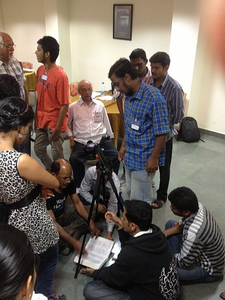Train The Trainer Programme for Wikipedians
The article by Subhashish Panigrahi was edited by Rohini Lakshane and published in DNA on November 14, 2013.
Twenty Wikimedians from 10 cities speaking 8 languages attended the 4-day Train The Trainer (TTT) programme conducted last month by the Centre for Internet and Society's Access To Knowledge programme (CIS-A2K) at Bangalore. Twenty active Indian language Wikimedia communities spread across the world are moving ahead the bandwagon of collaborating with each other and carving their mark on the world's largest encyclopaedia and its other sister projects. Apart from editing Wikipedia articles, some Wikimedians devote their time to bringing new blood into the community and fostering it, so that the community grows. Indian language Wikimedia communities need to empower Wikimedians who would lead the outreach activities locally in their vernacular communities. The idea of the TTT programme was born out of this need.
The TTT programme kicked off on October 3 with Wikimedians from Punjab, West Bengal, Odisha, Andhra Pradesh, Gujarat, Maharashtra, Karnataka and Kerala. They delivered presentations on various topics: Why the society needs Wikipedia; Wikipedia in Indian languages; How articles about diseases and other common medical science topics could be improved to help people; etc. Their presentation delivery skills were assessed by CIS-A2K's Director and Manager and they were offered individual assessment and feedback. Personal trainer Sachin Nagarajappa spent time with Wikimedians discussing mistakes that trainers do while conducting workshops and gradual improvement techniques for impactful outreach. Malayalam Wikimedian Viswanathan Prabhakaran held a session on "Crowd Sourcing from the Future" explaining various layers of crowdsourced projects.
On the next day, groups of Wikimedians were assigned the task of delivering a Wikipedia editing session to the audience as if the latter were new editors. Sachin conducted an advanced presentation skill improvement workshop based on inputs gathered from participants and the assessment of the group presentations. Veteran Wikimedian Hari Prasad Nadig shared lessons on "Challenges and Opportunities in building an Indian Language Community online". FOSS activist and CIS Executive Director Sunil Abraham conducted two sessions: "A spectrogram-based activity to simplify the criticality of Neutral Point of View" and an interactive session on offline and online outreach, "Speed Geeking". These were followed by one-on-one discussions on improving presentation skills.
 |
Typing in Indian languages is not easy, especially with the many typing layout standards used in the public and private sectors in India. CIS-A2K's Programme Officer Dr. U.B.Pavanaja conducted a session on the Unicode standard for Indian languages, its use and fonts in different operating systems. Social media expert and Wikimedian Tinu Cherian shared the secrets of popularising Indian language Wikipedias and bringing outstanding contributors to the limelight. He also spoke about how the media played an important role in showcasing initiatives for free encyclopaedic content contribution in India, and shared tips on using the social media. CIS-A2K's Programme Director Vishnu Vardhan shared case studies of making Wikipedia workshops interesting, interactive and fun. Viswanathan and CIS-A2K's Programme Officer Subhashish Panigrahi demonstrated how to set up a handheld digital camera-based prop to easily digitise books without using a scanner. |
|---|
The most vital part of Wikipedia articles is citing references. Wikimedian Shyamal Lakshminarayan demonstrated how finding sources of references and citing them on Wikipedia could be made easier using various tools. Board member of the Wikimedia Foundation and writer Achal Prabhala shared stories of documenting orally continued traditions in Kerala and South Africa for building references on Wikipedia. He also shed light on how copyright laws evolved in the context of copyright issues that Wikipedia contributors face, and on content donation on WikiSource and other platforms.
Wikimedia India's founding member and veteran Telugu Wikimedian Arjuna Rao Chavala spoke about the history and future plans of Wikimedia India.
The participants then went to M.G. Road Boulevard to see the weaving work by Gandhians, a philately exhibition on Gandhi, and spent some time with Namma Metro's staff to learn about the operations of the Metro. Dr. U.B. Pavanaja and Kannada Wikimedian Om Shivaprakash guided the Wikimedians to the office of Deccan Herald-Prajavani where they observed the newspaper production process and learnt about the use of Kannada Unicode fonts in newspaper printing. The editor and staff of Prajavani learnt about the use of the Wikimedia Commons as a free media repository. The Wikimedians left Bangalore with happy faces with the hope of cultivating more editors in their communities.
- Link to the meta page here
- More pictures here


